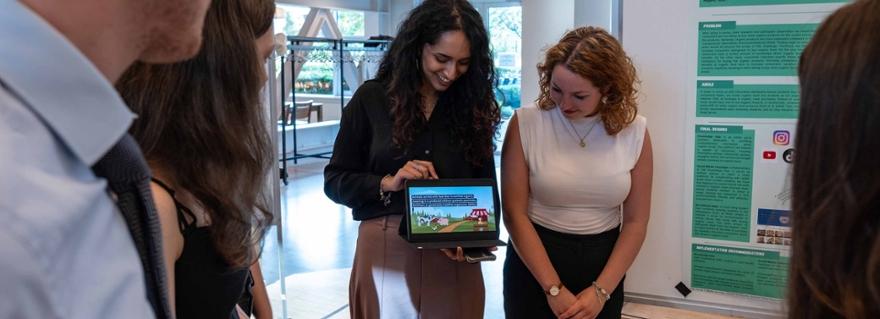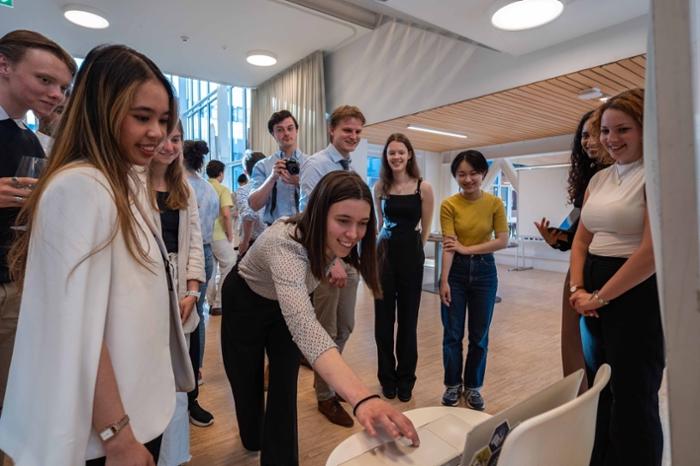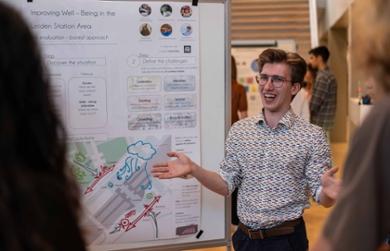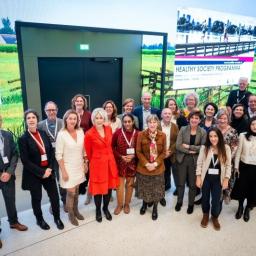
For months, students dedicated themselves to a more sustainable world alongside their studies, as part of the LDE Sustainability Honours Programme. What solutions did they come up with for the challenges posed by organisations like Naturalis and ClimateMatters?
During the festive closing of their challenges, students of the LDE Sustainability Honours Programme presented their sustainability plans to their clients. Over the past months, they worked in groups on the questions posed by their clients in the context of sustainability.
Organic food: the latest trend?
Leiden's museum Naturalis asked several students how they could educate people better about organic foods. Organic food is not only good for our health but also for biodiversity. ‘During the cultivation of organic food, no harmful pesticides are used. As a result, there are fewer pesticides in nature as well as in our bodies’, says 20-year-old business economics student Jolle Merkus.
Therefore, the students built a website with information about organic foods. Articles, a quiz and recipes teach the reader more about organic foods in an interactive way. How can this website become a success? Through influencers! ‘We noticed that influencers can spreak a message to a wide audience. If a video goes viral with them, organic food might just become a trend’, according to student Ayesha Felice Zain (20), who advices Naturalis to seek collaboration with them.

Money, medics and major pharmaceuticals
Another group delved into the waste problem within healthcare for their client, the OLVG Hospital. They encountered one major issue: the pharmaceutical companies. ‘Shareholders within this industry have an interest in producing waste’, claim these students.
These students have truly given us new insights' - stakeholder Leiden Centraal.'
They argue that these companies make a lot of single-use tools, while this isn’t always necessary. ‘Making specific adjustments within hospitals is important. But ultimately, a change in behaviour of the entire market will do much more’, says Aerospace Engineering student Louise Brouwers.
If it's up to the students, this change starts with legislation to reduce waste. Pharmaceutical companies should no longer be allowed to make their products single-use, unless it's truly necessary, such as for maintaining cleanliness. By placing the responsibility on pharmaceutical companies, healthcare workers are relieved from this task and can focus on their work as caregivers, the students argue.
People and nature

ClimateMatters asked students for ideas to make Leiden Central a more sustainable area, while focusing on the well-being of people. The idea behind this? People’s well-being improves in a greener (and therefore more sustainable) environment. A win-win situation!
To create a more pleasant environment for both people and nature, the students decided to focus on aspects such as the amount of greenery, the number of seating areas, waste management and crowding. To determine what people need, they devised “walk-along interviews".
‘These students have truly given us new insights. With their “walk-along interviews”, they asked passersby at the station how they would like to see sustainability implemented’, explains client Roel Cremer. ‘We will definitely incorporate this into our plans for the renovation of Leiden Central'
Text: Krisz Lucke
Photo’s: Eric van den Bandt

